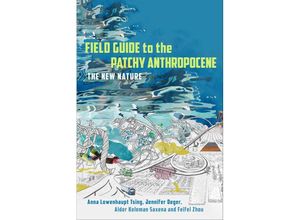Nature has gone feral. How can we re-attune ourselves to the new nature? A field guide can
help. While the global scientific community recently made headlines by ruling the
Anthropocene-an era many date to the Industrial Revolution when human action truly began to
transform the planet-did not qualify for a geological epoch quite yet understanding the nature
of human transformation of the Earth is more important than ever. The effects of human activity
are global in scope but take shape within distinct social and ecological "patches "
discontinuous regions within which the key actors may not be human but the plants animals
fungi viruses plastics and chemicals creating our new world. Field Guide to the Patchy
Anthropocene takes stock of our current planetary crisis leading readers through a series of
sites thought experiments and genre-stretching descriptive practices to nurture a revitalized
natural history. Field guides teach us how to notice name and so better appreciate
more-than-human worlds. They hone our powers of observation and teach us to see the world anew.
Field-based observations and place-based knowledge cultivation-getting up-close and personal
with patchy dynamics-are vital to truly grapple with the ecological challenges and the
historical conjunctures that are bringing us to multiple catastrophic tipping points. How has
commercial agriculture runoff given rise to comb jellies in the Black Sea? What role did the
Atlantic slave trade play in the worldwide spread of virus-carrying mosquitoes? How did the
green revolution transform the brown planthopper into a superpredator in Philippine rice
fields? Questions like these open up new ways of understanding and ways of living through the
epoch that human activity has ushered in. This Field Guide shifts attention away from knowledge
extractive practices of globalization to encourage skilled observers of many stripes to pursue
their commitments to place social justice and multispecies community. It is through attention
to the beings places ecologies and histories of the Anthropocene that we can reignite
curiosity wonder and care for our damaged planet.

